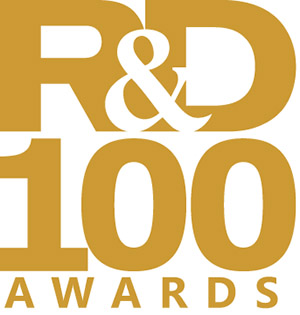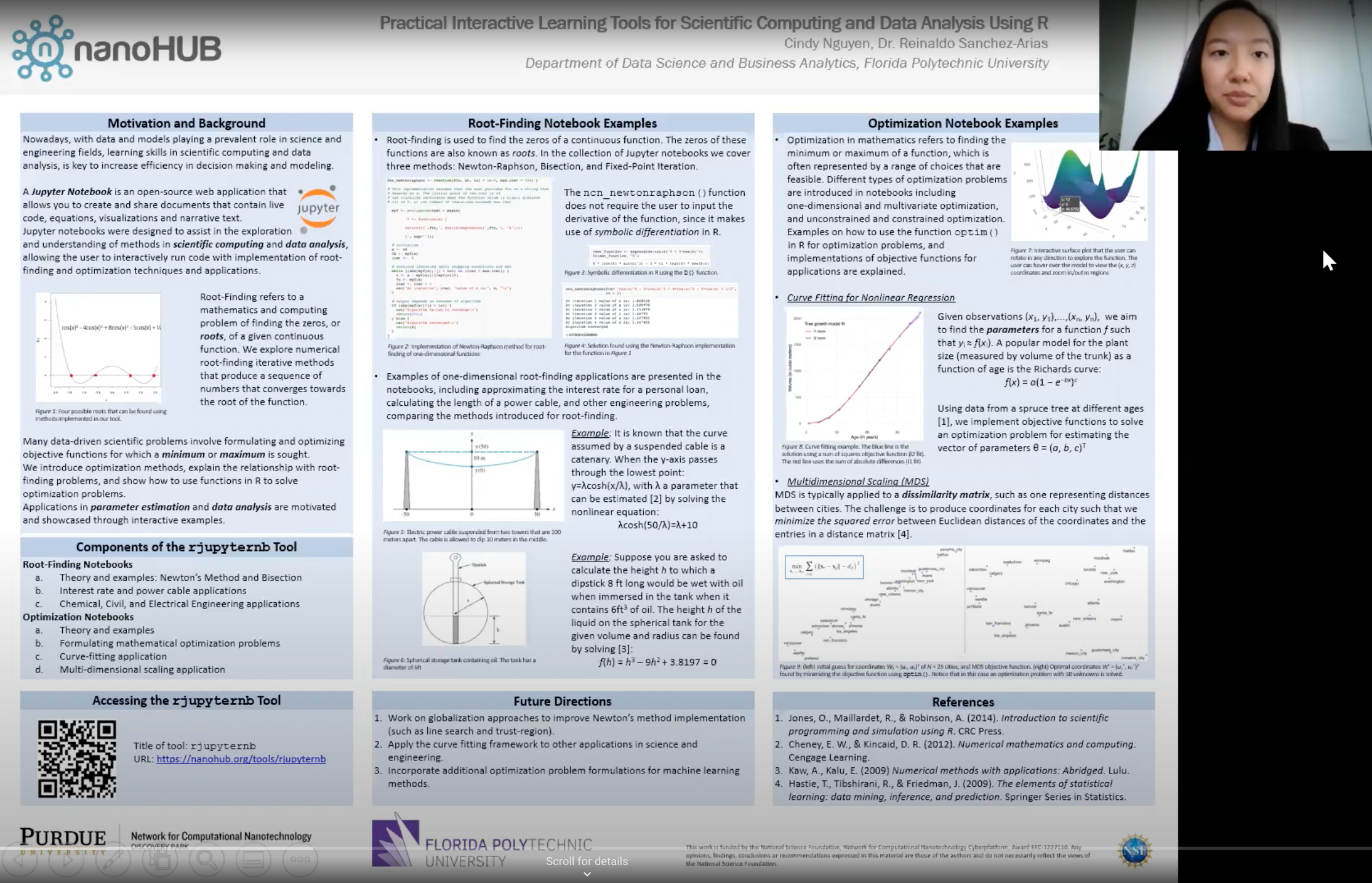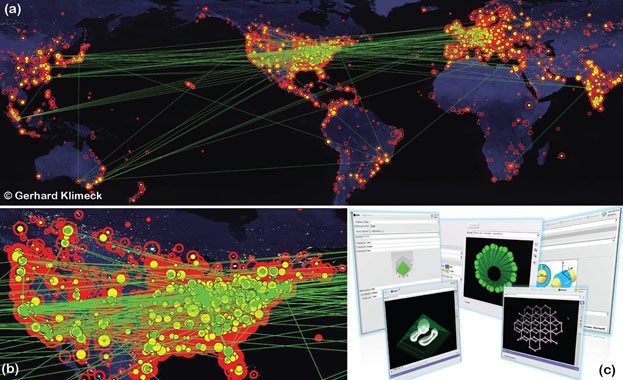|
Issue 44
Planned Maintenance
There is planned maintenance scheduled for nanoHUB on Monday, September 28 beginning at 12 p.m. EDT and lasting approximately 4 hours. All tool sessions will end and there will be an outage for tools and other features of the hub during the maintenance period. Please plan accordingly. We apologize for any inconvenience. nanoHUB is a Finalist
The 2020 R&D 100 Award finalists have been unveiled, and nanoHUB is among them! We are excited to be recognized and proud to stand alongside other world-changing innovators.
This prestigious award was established in 1963 and recognizes the year's most revolutionary developments in science and technology. Past R&D 100 Awards recipients include Fortune 500 companies, small academic laboratories, and everything in between.
nanoHUB is competing in the software/services category with a proposal titled "nanoHUB: Making Simulation and Data Pervasive".
Please register for the virtual award presentation and cheer us on as the winners are announced live. The session for the software/services category will take place on October 1 at 3:00 p.m. Eastern time and is free to join.
Thanks for all the support you have given to nanoHUB over the years!
Learn more → Opening Doors for Students and Faculty: Summer Programs Deliver Educational Gateway Tools Developed by Students
By Claire Stirm
The Network for Computational Nanotechnology Undergraduate Research Experience (NCN URE), based at Purdue University, is a summer program that provides students an opportunity to work on research projects. Students in this program receive training on building nanoHUB simulation tools, such as learning how to develop tools with Jupyter Notebooks, while being paid for their effort as interns. Students also attend workshops focused on developing other skills such as science communication. Students then apply these new skills by contributing their first simulation tool to nanoHUB.org, a science gateway for interactive simulation tools that enable research and teaching across nanotechnology domains. Dr. Tanya Faltens, the Educational Content Creation Manager for NCN, leads this program and pairs students with a faculty advisor and mentors to help with day-to-day guidance.
What is unique about the NCN URE program is that Dr. Faltens and the nanoHUB team reach beyond four-year university programs and care about helping students from community colleges or two-year programs. The program provides these students with research experience and increases their opportunities for and interest in pursuing a career in academia. In recent years, more students attend the program remotely and only come to the onsite program at Purdue for the last week to present a poster about their work and meet their fellow students.
Read more → nanoHUB is Democratizing Learning and Research in Nanotechnology
By Gerhard Klimeck, Director of NCN
In the early 2000s, areas of computational science such as computational chemistry or computational material science already had well-established software packages. However, everyday experimentalists couldn’t use them to guide or explain their experiments, nor could educators use them easily to teach the underlying concepts.
Worryingly, a similar situation was unfolding in nanotechnology. The United States annually invests $1.5 billion in nanotechnology research, which generates lots of software and data. But access remained a stumbling block. Artifacts such as simulation tools and data from research were not accessible to others, and the broader audience could not learn from the research. Questions lingered: How do we create meaningful modeling and simulation tools? How to develop a system to share these tools? How to create user-friendly graphical user interfaces to simplify the use of complex software?
We created nanoHUB as a way to enable access to modeling and simulation and to democratize learning in nanotechnology, and it has become the world’s first end-to-end science and engineering cloud. The online platform converts generated resources into usable, user-friendly apps, and now has a global user base. nanoHUB has 18,000 users who run a million simulations annually — and those numbers are growing.
Read More at Purdue ECE News → Have You Updated Your nanoHUB Profile Recently?
Other nanoHUB users want to connect with you! But will they be able to find you?
One of nanoHUB's biggest strengths is its community. Updating your profile on nanoHUB is a fantastic way to connect with other researchers or colleagues who might be able to offer new insights into your work.
You can share a picture, biographical info, your research interests, your ORCID, your current projects, your work or school location, and other useful information. And don't worry: you have complete control over your data. You can set individual fields to be public or private, depending on your needs.
You can get started now. Just log in to nanoHUB and click the "Profile" link from your dashboard, or from the "Logged In" dropdown menu in the upper-right corner of any nanoHUB page.
Update Your Profile →
Upcoming Events
Gateways 2020
When: October 19-23, 2020
Where: Online
This gathering for gateway creators and enthusiasts features hands-on tutorials, demos, keynotes, presentations, panels, posters, and plenty of opportunities to connect with colleagues. Gateway developers and users—regardless of their domain area—have a lot in common but have had few venues for exchanging experiences. The fifth Gateways annual conference is an opportunity for gateway creators and enthusiasts to learn, share, connect, and shape the future of gateways as part of a vibrant community with common interests.
Website: Conference Information and Registration
IEEE International Conference on "Nanomaterials: Applications & Properties" (NAP-2020)
When: November 9-13, 2020
Where: Online
#NAP2020 is:
- One of the largest nanoconferences in Eastern Europe
- Internationally renowned invited speakers
- Interesting interdisciplinary scientific program
- Best presentation awards
- Exceptional Ukrainian hospitality, now in a virtual format
- Scopus & Web of Sciences indexed Conference Proceedings
Website: Conference Website

Highlighted Resources
This tool is a computational companion to Tutorial on Neural Systems Modeling, which is a textbook for students beginning their study of computational neuroscience. More generally, it is intended for users who want to develop an understanding of neural systems modeling, but who lack specialized backgrounds in mathematics, computer programming, or neuroscience. The tool combines all book example models, each of which simulate the properties of a real neural system. These models supplement the textbook's introduction to the elegant and beautiful conceptual tools that provide real and satisfying insight into the workings of the brain. This tool contains models for chapters 1-5.
This lab introduces students to an end-to-end example of applying a machine learning (ML) workflow to a materials science dataset to address a research problem. The lab aims at deepening the conceptual understanding of ML, and while procedural skills such as writing Python code are not the focus of this lab, students will gain experience with a number of standard open source packages by interacting with code snippets through the Jupyter Notebook format and describing what each essential command does.
This tool allows users to visualize the effects of doping on carrier concentration in bulk silicon. It utilizes the non-degenerate Maxwell statistics to explore the effects of doping and temperature on carrier concentration and the energy band diagram.
|







